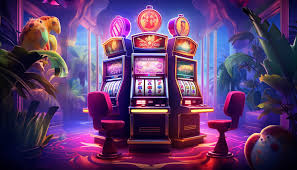
Over the past two decades, online slot has transformed from a niche pastime to a global cultural and economic phenomenon. With the widespread accessibility of high-speed internet and the rise of smartphones, millions of people across all demographics are engaging in virtual worlds, competitive multiplayer environments, and social gaming platforms. This article explores the evolution of online gaming, its impact on society, and what the future might hold for this dynamic industry.
The Evolution of Online Gaming
Online gaming began modestly with text-based multiplayer games in the early 1980s, known as MUDs (Multi-User Dungeons). These games allowed users to interact and explore virtual worlds using text commands. The arrival of personal computers and the internet in the 1990s spurred the development of more complex multiplayer games, such as “Ultima Online” (1997) and “EverQuest” (1999). These titles introduced persistent worlds and allowed players to interact with thousands of others simultaneously.
The turn of the millennium saw online gaming take a leap forward with the introduction of broadband internet and new gaming consoles like the PlayStation 2 and Xbox. These systems allowed for faster connections and the birth of online console gaming. Microsoft’s Xbox Live, launched in 2002, became one of the first successful online gaming services, providing a platform for players to engage in multiplayer experiences, voice chat, and game-related content sharing.
The Explosion of eSports
One of the most significant drivers of online gaming’s popularity has been the rise of competitive gaming, or eSports. Games like “StarCraft” (1998) and “Counter-Strike” (1999) laid the groundwork for professional competitions, where players from around the world could compete for cash prizes and glory.
In the 2010s, games such as “League of Legends,” “Dota 2,” and “Fortnite” catapulted eSports into mainstream recognition. Tournaments for these games now draw millions of viewers, both in-person and via live streams on platforms like Twitch and YouTube Gaming. The annual “Dota 2” tournament, The International, offers prize pools exceeding $40 million, and the viewership for major events rivals that of traditional sports leagues like the NBA or Premier League.
Online Gaming as a Social Experience
One of the key aspects of online gaming’s success is its ability to create social connections. Whether through cooperative play in games like “Minecraft” or competitive matches in “Call of Duty,” players build friendships and communities. Gaming platforms such as Discord have further enhanced these social interactions by providing spaces for gamers to communicate and collaborate.
Massively Multiplayer Online Role-Playing Games (MMORPGs) like “World of Warcraft” (2004) became known for fostering tightly knit communities where players cooperate to complete quests and defeat difficult enemies. These virtual friendships often extend beyond the game, with players forming real-world relationships.
Moreover, the COVID-19 pandemic accelerated the role of online gaming as a social outlet. As traditional in-person socializing became limited, many turned to virtual platforms to stay connected. Games like “Animal Crossing: New Horizons” and “Among Us” provided a much-needed escape and allowed people to socialize safely during lockdowns.
Monetization and Economic Impact
The online gaming industry is a massive economic force, generating over $200 billion annually. The industry has shifted from traditional one-time purchases to more diversified monetization models. Free-to-play games, which allow players to download and play without paying upfront, have become a dominant trend. Instead of charging for the game itself, developers earn revenue through in-game purchases such as cosmetics, expansions, or virtual currency.
Games like “Fortnite” and “Genshin Impact” exemplify this model, earning billions of dollars annually despite being free to download. Microtransactions, season passes, and battle passes keep players engaged and spending money over time.
In addition to revenue from consumers, online gaming has attracted advertisers and investors. The growth of eSports, in particular, has opened up new opportunities for sponsorships and advertising deals, as brands look to reach a predominantly young and tech-savvy audience.
Challenges and Concerns
While online gaming offers numerous benefits—entertainment, social interaction, and even career opportunities—it also poses challenges. Addiction is one of the most significant concerns, especially among younger players. Games are designed to be engaging, and in some cases, this can lead to excessive time spent playing, impacting academic performance, relationships, and mental health.
Toxicity in online gaming is another issue that has received considerable attention. Harassment, hate speech, and cheating can create hostile environments for players. Many gaming companies are working to combat these issues through improved reporting systems, AI moderation tools, and more stringent penalties for violators.
Lastly, there is growing concern over the impact of microtransactions and loot boxes on young players. Critics argue that these features can promote gambling-like behaviors, leading to regulatory scrutiny in some regions. Several countries, including Belgium and the Netherlands, have moved to restrict or ban certain types of in-game purchases.
The Future of Online Gaming
The future of online slot gacor is incredibly promising. With advancements in virtual reality (VR), augmented reality (AR), and cloud gaming, the way we play games is poised to evolve. VR games like “Beat Saber” have already demonstrated the potential for immersive gaming experiences, while AR titles such as “Pokémon Go” blend the digital and physical worlds.
Cloud gaming services like Google Stadia and Xbox Cloud Gaming aim to eliminate the need for expensive hardware, allowing players to stream games directly to their devices. As internet speeds improve and 5G networks become more widespread, these services could make high-quality gaming accessible to more people than ever before.
In addition, the line between gaming and other forms of entertainment is blurring. Virtual concerts in games like “Fortnite,” where artists like Travis Scott and Ariana Grande performed to millions of viewers, show that games are becoming platforms for broader cultural experiences.
Conclusion
Online gaming has become a significant part of modern entertainment and socialization, attracting players of all ages from around the world. With its rapid evolution and increasing mainstream acceptance, the industry shows no signs of slowing down. As technology continues to advance and games become more immersive and socially connected, online gaming will remain a defining feature of the digital age. However, addressing issues such as addiction, toxicity, and monetization will be crucial to ensuring that online gaming remains a positive and inclusive space for all players.



